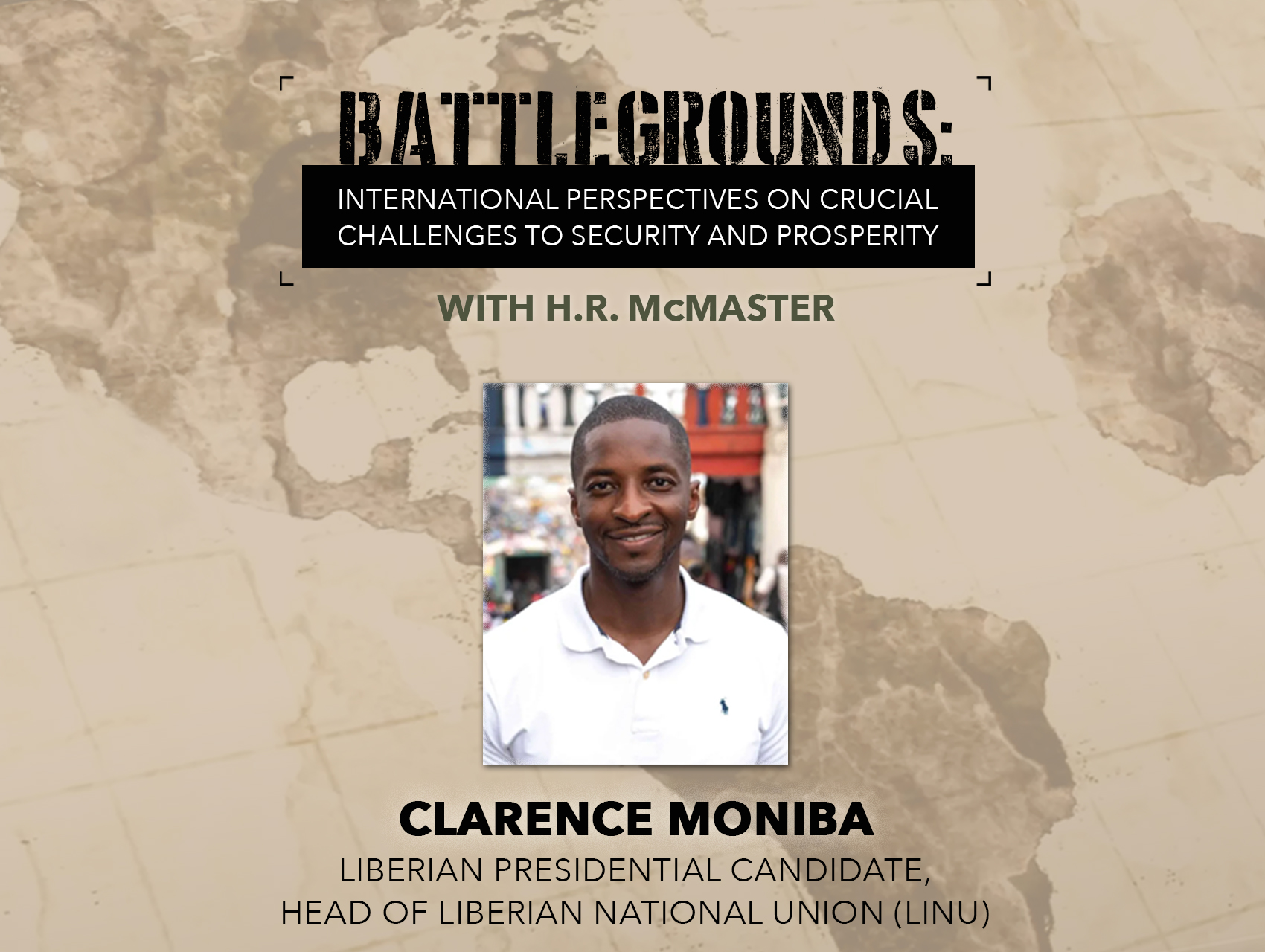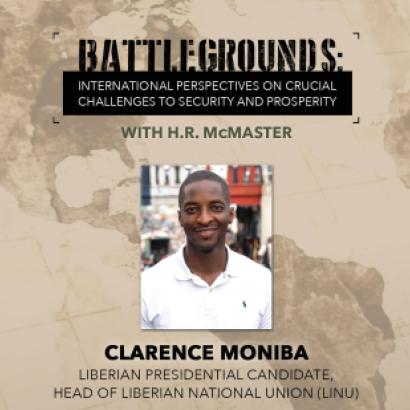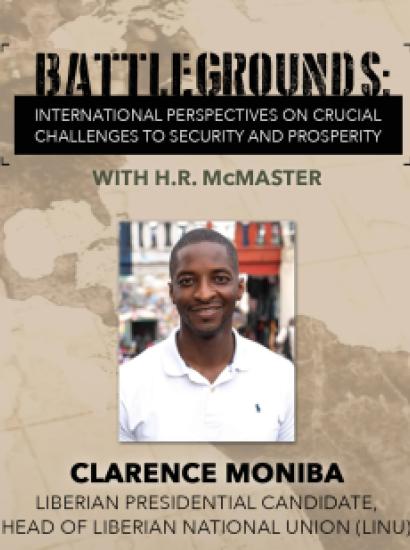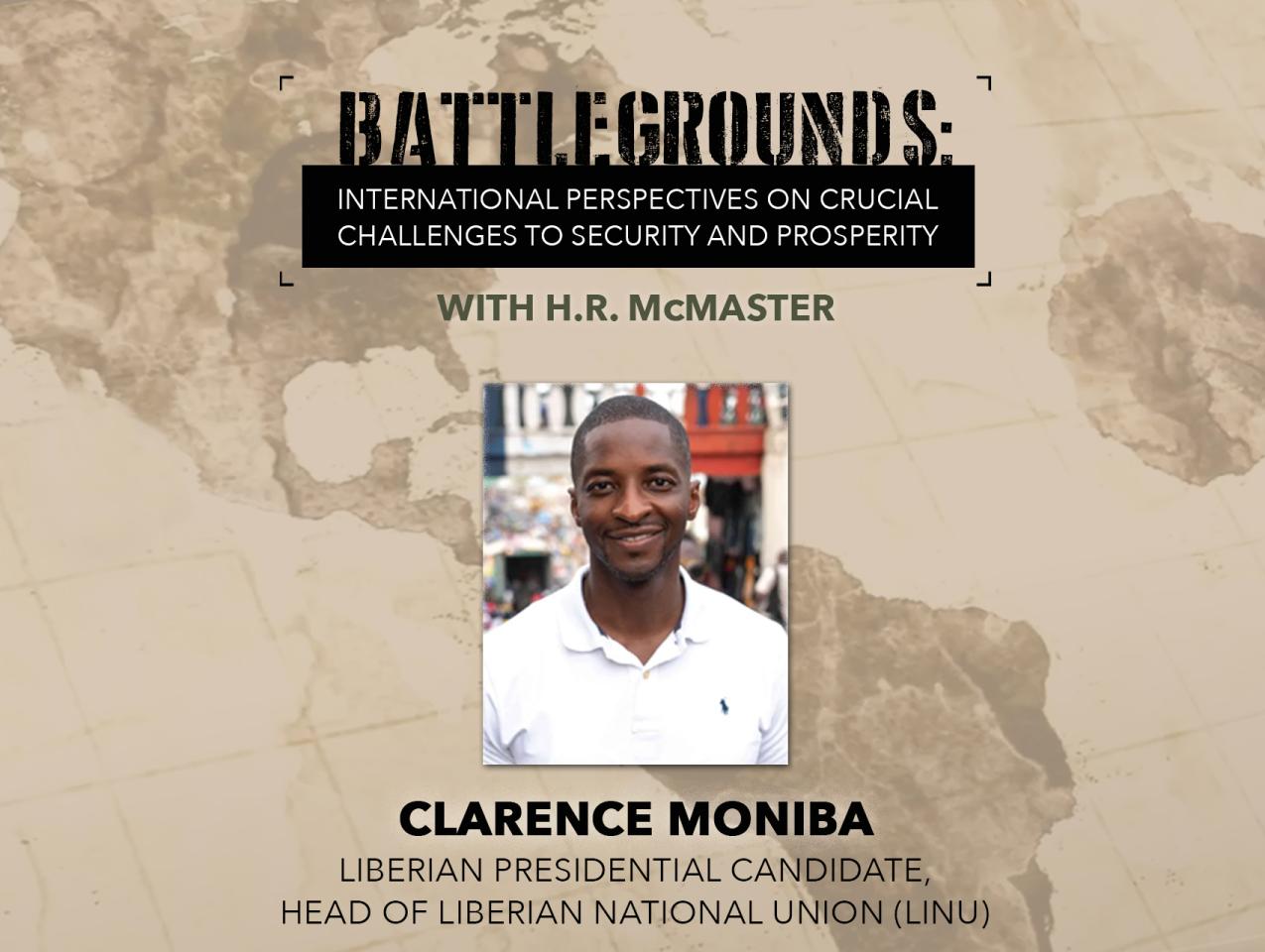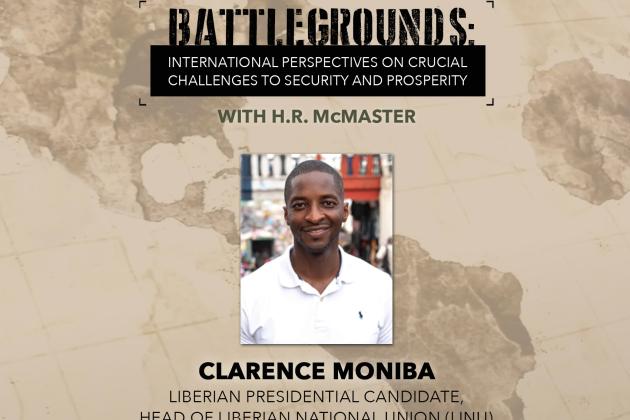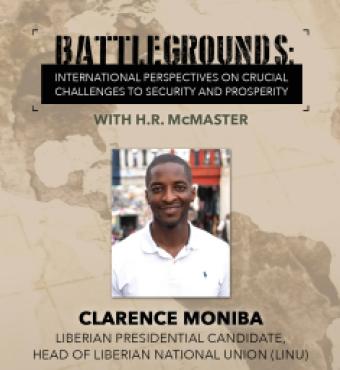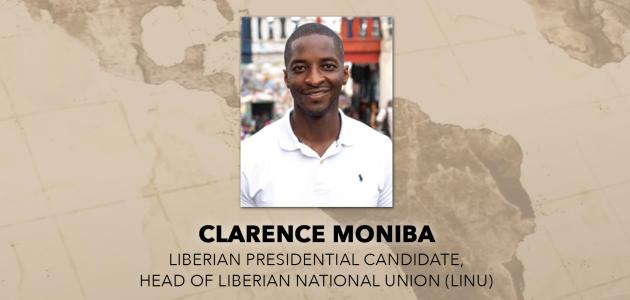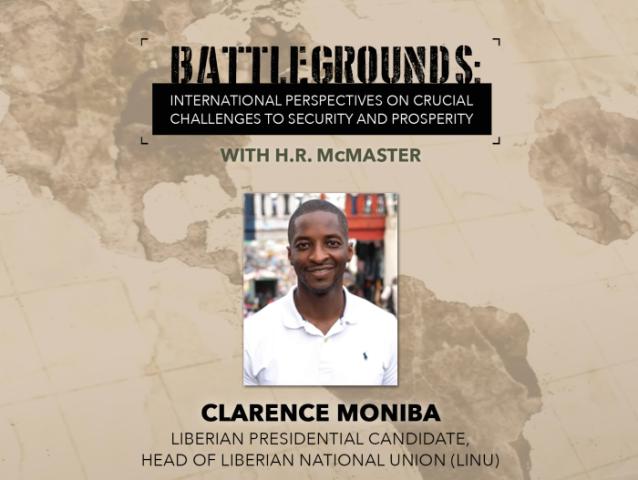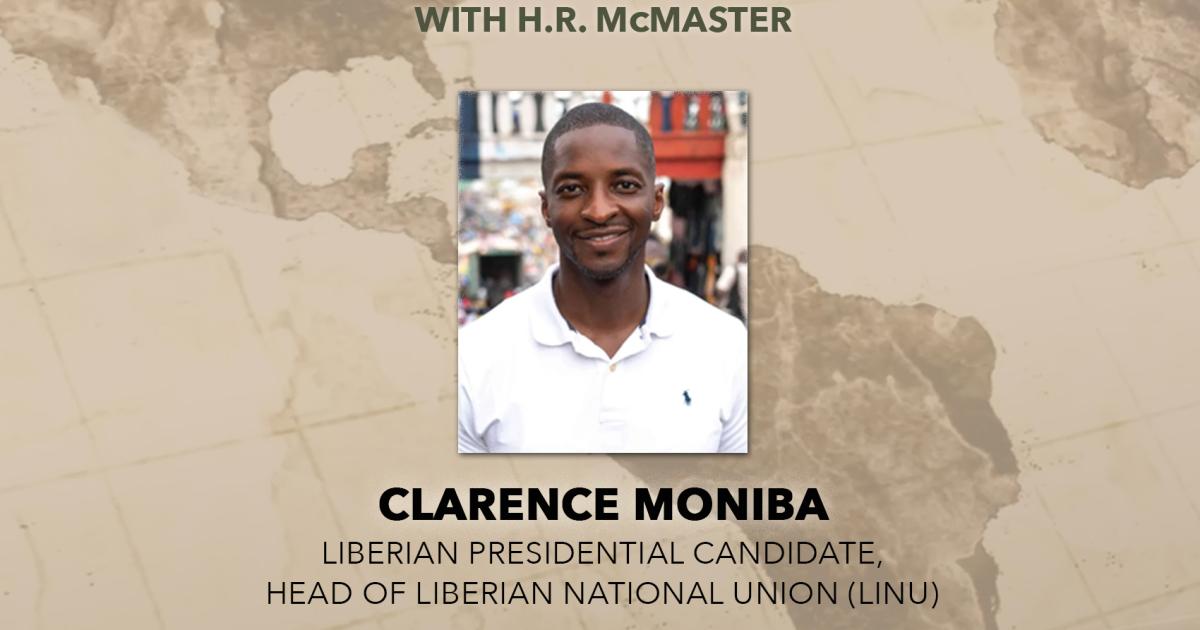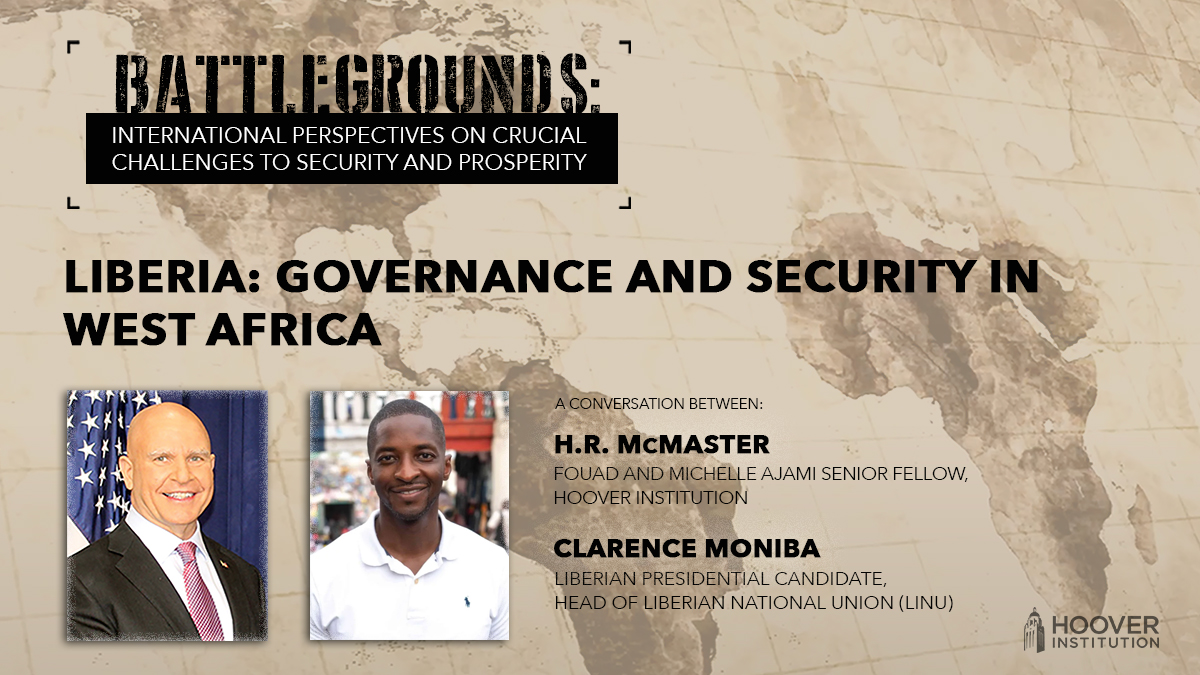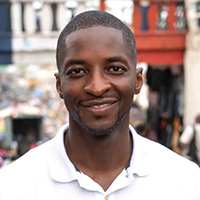
In this episode of Battlegrounds, H.R. McMaster and Clarence Moniba, Liberian Presidential Candidate, Head of Liberian National Union (LINU), discuss Liberia’s future and political and economic trends in West Africa on Wednesday, June 7, 2023.
This perspective from a Liberian presidential candidate sheds light on challenges facing West Africa. Hoover senior fellow H.R. McMaster hosts Dr. Clarence Moniba to discuss pressing issues of governance and security on the African continent.
>> HR McMaster: America and other free and open societies face crucial challenges and opportunities abroad that affect security and prosperity at home. This is a series of conversations with guests who bring deep understanding of today's battlegrounds and creative ideas about how to compete, overcome challenges, capitalize on opportunities, and secure a better future.
I am HR McMaster, this is Battlegrounds.
>> Jenn Henry: On today's episode of Battlegrounds, our focus is on the West African country of Liberia. Our guest is Doctor Clarence Moniba, a candidate for president of Liberia and leader of the Liberia National Union Party. Doctor Moniba served at the Liberian embassy in Washington, DC, followed by the permanent mission of Liberia to the United Nations.
Doctor Moniba was the youngest person in Liberian history to be named a minister of state without portfolio and the youngest person to serve as chairman of the board of the Liberia Electricity Corporation. He earned a master's in public administration from Harvard University and a PhD in rhetoric and communications from New Mexico State University.
Doctor Moniba played American football in college and professional football in the Arena League. Moniba's father, Doctor Harry F Moniba, served as vice president of Liberia from 1984 to 1990. Liberia is one of the most ethnically diverse countries in the world. Beginning in the 14th century CE, tribes including the Keipella, Basa, and Vai migrated to present day Liberia, largely due to the instability that followed the decline of the Mali empire and Songhai empires.
By the 15th century, European merchants arrived in Liberia and established trade in commodities including peppers, gold dust, and ivory. In the 18th century, United States various constituencies sought to emigrate free blacks to Africa while maintaining the horrific system of chattel slavery. Slaveholders feared a growing free black population would incite a slave rebellion, particularly after the successful Haitian revolution of 1791.
However, many black southern farmers saw it as an escape from servitude in America. Despite strong protests from abolitionists, including prominent black individuals like David Walker, the American Colonization Society, ACS initiated an emigration program in 1822. They sent free Black Americans and a small group of white ACS members to settle the land that became Liberia.
In 1847, Liberia declared independence and became the first independent state in West Africa. Its first president, Joseph J Roberts, established diplomatic ties with England and France, but the United States feared that acknowledging Liberian independence would galvanize abolitionists. US President Abraham Lincoln affirmed Liberia's independence during the civil war.
Liberia joined the League of Nations in 1919 and experienced strong demand for its natural resources, particularly rubber. Due to its burgeoning automobile industry, European and us powers won extractive contracts and offered loans with steep interest. Foreign economies and corrupt Liberian officials benefited from a system of forced labor on rubber plantations in Liberia that was hardly distinguishable from slavery.
Liberia continued to grow despite challenges. President W V S Tubman, who served from 1944 until his death in 1971, established a nationwide public school system, introduced suffrage and property rights for women. And vastly increased the constitutional rights of Liberia's tribespeople, who comprised 80% of its population. His successor, President William Tolbert, gradually limited freedoms of the press and created a broad system of spies to report political dissent.
In 1980, Sergeant Samuel K Doe of the Liberian army staged a coup d'état and executed Tolbert. Doe suspended the constitution, established authoritarian military rule, and won re election in a fraudulent race. Civil War erupted in 1989 when warlord Charles Taylor led a revolt to overthrow Doe. Nigeria and Ghana sent peacekeepers to attempt to end the Civil War under the mandate of the Economic Community of West African States, ECOWAS, a regional organization.
ECOWAS convened an all Liberia conference in Gambia to elect an interim government led by Doctor Amos Sawyer to replace the Doe regime after Doe's assassination in 1990. Yet Taylor besieged Monrovia as seven factions continued to fight and vie for power. In 1995, Nigerian officials forced the factions to sign the Abuja Accord and abide by the results of UN monitored elections, which Taylor won despite having catalyzed one of Africa's bloodiest civil conflicts of the post independence era.
By 1997, over 200,000 people had died and over 1 million were displaced. Civil war erupted again from 1999 to 2003, resulting in 50,000 additional fatalities, thousands were displaced. Widespread violence and human rights abuses, including the use of child soldiers, characterized both civil wars. In 2003, peace talks in Ghana called for the end of Taylor's rule, the formation of a new transitional government led by Guyod Bryant, the preparation of national elections, and the deployment of UN peacekeepers.
In 2006, Ellen Johnson Sirleaf won the presidency and became the first female African head of state. President Sirleaf served until 2018. She won the Nobel Peace Prize for promoting peace and advocating for women's rights. Liberia has made significant progress towards stability since the end of the second civil war.
It navigated instability from the 2013 Ebola outbreak, but economic issues, including high unemployment and corruption, remain challenges to progress. We welcome Doctor Moniba for a wide ranging discussion on Liberia's future and political and economic trends in West Africa.
>> HR McMaster: Doctor Clarence Moniba, welcome. It's great to have you on Battlegrounds.
>> Dr. Clarence Moniba: No thank you very much. You're doing a great job on teasing out ideas and discussion topics. So very happy to be here, and I look forward to our conversation.
>> HR McMaster: Well, hey, thanks for making the time. I know you're in the middle of an election campaign in Liberia, and I thought maybe we just start with that.
What are you telling the people of Liberia about your vision for the country? It's one of obviously the most ethnically diverse countries in the world. You have 28 ethnic groups and languages. I know you've been traveling all over the country. Can you share what it's been like to campaign, but mainly your vision for the country?
>> Dr. Clarence Moniba: I think the first thing that we have to do in Liberia is to actually believe that we can have a better country. And the challenges that we have right now in the country is that yet the development of our country, 70% of the people live in darkness, 60% of the roads in this country are unpaved.
There's high, massive unemployment rates. The security sector is also very low. And so a lot of people are already frustrated of all of the politicians who have come before. So when you start to engage people, whether it's in the markets or on the streets, the university students, so much.
Under development, there's so much corruption in the country and so we actually have to have them start to believing that there are good Liberians in this country who want to take leadership, who want to give instead of gain. And so because of that, our efforts, our message is very simple.
We believe Liberia is going to be a great country one day. We, our generation, the young people of this country and of the continent in general. When you look at Africa, we have to be the ones to make Liberia great, to make Africa great aAnd so that's the challenge we're taking up when we go on the campaign trail, when we discuss with people, and when we engage with the citizens.
>> HR McMaster: Doctor Monipaugh, the challenges are considerable, right. Obviously, you mentioned some of the difficulties that you encounter in Liberia but of course, across the continent, 40% of the African continent's population. I think as of 2022, is under 15 years of age and I think the statistic that most people agree on is that the working age population is expected to grow by close to 70% by 2035.
So, of course, the continent, your country, needs jobs, right. It needs a future of hope for those young people. What are some of your policies you have in mind for economic growth and development and meeting the expectations of that burgeoning young population?
>> Dr. Clarence Moniba: That's an interesting question, the people of Liberia and the people of Africa in general are impatient.
We're tired of seeing other countries develop, it's so interesting to understand that Liberia, it's almost like we don't think we deserve to be better. We don't think we deserve great things in our lives. So when we talk about what we have to be able to do to change our economy, I think it's very simple.
Right now, in Liberia, our staple food is rice. Every single day, Liberians, we have to eat rice, yet still we import almost 70% of the rice we eat in this country and from far places like Asia. So China, Thailand, Indonesia, places like that, but yet still. So I always talk about the fact that we have a very big seaport here in Liberia.
When we want rice, we don't go to the land, we go to the sea and ask, when is rice coming to our country? As opposed to building our infrastructure to be able to create and grow rice and things of that nature. So I think to be able to address job security, which also will coincide with food security, we have to go back to the land.
We have a country of 5 million people, we have 43,000 square meters, so we don't have a country that's step up. It's raining six months out of the year yet the majority of the people, the majority of the youth live in the urban areas not doing anything, not working, there's no skill development.
So yes, we need to focus on agriculture, getting people back out to the soil and then also building all the other industries around post production value addition and then we also have to be able to provide people with skills. In Liberia right now, when you look at some of the most of our schools, unfortunately, our students go to school and there's no food, a lot of, there's no school feeding programs.
Our teachers are paid as little as $20 a month, us dollars a month. A lot of students, they sit on the floor again, I talked about there's no electricity, there's no indoor plumbing. And so our education sector right now is very poor, which also multiplies when the person graduates from high school fairly illiterate and then they try to enter the job market.
To change the economy in Liberia and change the future of millions of Liberian children is to be able to add skills, technical and vocational training to the youth of this country. So one of my policies that I think not only Liberia should do, but Africa as well, is to be able to sit there and make sure that everybody who graduates from high school must have two years of technical and vocational training.
We have to be able to give people the opportunity to be able to not only contribute to the development of the country, but also to their own lives and so that's what we have to be able to do. I think agriculture is huge, as I talked about, getting people to work in the soil and then technical and vocational training, we have to look at those two things at the very foundation as we try to redefine our economy and our country.
>> HR McMaster: Doctor Mornibal, I think you're, your description is really insightful because I think what you're seeing is how these problems that you're coping with and the challenges you're trying to overcome are interconnected. You're from food security and your ideas about invigorating agriculture and youth unemployment, and health security, and it all going back to education and vocational training.
And so Liberia's had some, some significant challenges in the area of, in all of these areas but could you maybe talk in particular about health security? I think Liberia is a country we learned a lot from in connection with the Ebola story of course, the world's coming out of the COVID pandemic.
What's your assessment of health security in your country maybe some broader observations you have in the continent. I'm thinking of how Liberia has been working hard to improve maternal mortality rate and women's health but can you talk about the health sector in particular and what you hope to do to improve healthcare?
>> Dr. Clarence Moniba: I always like to sometimes when we talk about these issues, I like to sometimes give examples, because a lot of things that we talk about, unfortunately, is very negative. And it's tough to be able to sit there and talk about your own country in a negative sense, but it's so difficult because that's what it is right now.
I always give people an example when I go out on a campaign trail and I ask them, I say, our airport is called RIA, is Robertson International Airport, and the biggest hospital in Liberia is called JFK, after John F Kennedy. And I always ask them, I give them an option, I say, do you want to go to, God forbid, if you get sick, do you want to go to RIA or JFK?
Where would you want to go? And not one single Liberian ever says they want to go to our state run hospital. It's simply because when you go there, there's no medicine on the shelves. The doctors, we have committed doctors, we have committed nurses, but we don't give them the facilities to be able to succeed.
We don't give them the training to be able to succeed, so they're working against all odds to be able to deliver medicine and treatment and medication to people when it's not there. So when we talk about the health security in this country, even when you look at the other major hospital we have, both do not have credible electricity sources.
So when, if you're going under operation, you're scared to death. When you go to the rural areas of our country, a lot of time, pregnant women have to get on motorbikes to drive 30 minutes, 40 minutes to the next village or town so they can go to a clinic that may or may not have electricity, may or may not have the doctor on call.
Just a couple of weeks ago, one of my volunteers unfortunately broke their leg and they had to be taken an hour plus away to the nearest hospital. And the bone specialist was not going to be there for three days and so this is the situation that we have in the country that we have to be able to address.
And so that's why it's so important, first of all, when we talked about connectivity, we talked about job security, food security in Liberia, the connectivity also is in healthcare and road networks. I said earlier that 60% of the roads in Liberia are unpaved. And so because of that, we barely have any ambulances around the country.
Because sometimes it rains so much, the roads are impassable. So when people get sick in the villages, they themselves cannot get care. That's why it's so important to be able to focus on community health workers, people in the community who can at least do the very basic diagnostics of people who are sick.
Of course, we know malaria is very big in Liberia, again, and there's no true surgery in Liberia. Most people in Liberia, which is only the few percentage of the people, if they get sick, like I was saying before, they either go to Ghana, they go to India, they go to Europe.
Or they go to the United States. But only a very small portion of Liberians can afford to leave the country for treatment. And so because of that, people die in Liberia for absolutely no good reasons outside of not having proper medical care, proper diagnostics. So it's very difficult in Liberia, as we try to say that we need better medical treatment, we need better trained nurses and doctors.
We have to be able to provide them the opportunities to get better, to serve and cater to the Liberian people, which is not what we're doing. So training is very important in education, in healthcare, and in agriculture. In every sector we have in Liberia, we have to fundamentally change the way that we learn and change the way that we apply our skills in service delivery.
>> HR McMaster: Doctor Moynibal, you have a really forward looking vision, and of course, you're in a country that is really diverse in terms of traditions and culture. As you travel the country, what kind of a reception are you getting for your ideas? I'm thinking of some of the cultural impediments associated with women's rights.
For example, I know that there still is a tradition in Liberia, but across Africa of female genital cutting, for example. And other traditions that are impediments, in this case to women's rights or to just education broadly. I'm thinking of the rural bush schools which teach traditional beliefs on marriage, motherhood, and so forth.
What kind of reception are you getting across the diverse country that you're campaigning in?
>> Dr. Clarence Moniba: You know, it's very interesting on that question because you have to be able to shroud a line here in Liberia. Because, yes, we are a very, very traditional country, and we really hold tight to our traditional values.
Any attempt to really engage and try to change the traditional values, you're headed for serious trouble in this country. So what we have to be able to do, what we have leaders who want to transform and develop Liberia have to be able to do is to see how we can take the traditional values.
But also make sure it fits in line with the 21st century development that we must see in this country. Again, we cannot continue to say we have to stick to traditional values in the face of development. We have to have development in Liberia. And so when I talk to the people in the rural villages, they themselves understand that the life that they are living right now is simply not good enough for the Liberian people.
And so I always tell them, before we even start talking about specifics of how we want to change Liberia, we have to first agree. We have to first acknowledge that the Liberia we have must be changed fundamentally. And so once you start to understand that, once you start to talk to them about that, then they realize it's like, you know what?
He's right, because a lot of people in the rural areas, like I talked about, they do not have electricity. And so what I think spurs a lot of development a lot of times is when you see other countries doing better, people in the rural areas, they don't have that opportunity.
All they see is the village huts that they were living in, that their parents lived in and their grandparents lived in. Most people in Liberia live without exaggeration. Most people in Liberia live like it's 1822, meaning 200 plus years ago. They live in that houses, there's no electricity, there's no running water, there's no roads, there's outdoor bathrooms.
So they're doing the same things that their ancestors did, that generations before them did. So now, to be able to talk to these people, to say not only do we, yes, we have to keep our traditional values, but we must demand development. So those are some of the challenges when you go out and talk to the people of Liberia.
The one thing I'm sure of is that we are desperate, desperate for a change. And those are some of the reasons I'm running for president, to be able to show to the Liberian people that we don't have to lower our standards when we talk about politicians. We do not have to lower our standards when we talk about people who want to lead us, so we have to be very clear about that.
Traditionally in Liberia, I'm not the typical politician per se in Liberia, you're normally in your 60s and 70s, and I've been blessed to have been western educated. But then also have lived in Liberia and worked in Liberia as well. So I'm trying to blend the traditional with the forward thinking and the 21st century ideas that we must be able to bring to Liberia.
If we want to be self sufficient in food, if we don't want our people dying for diseases or sicknesses that has been cured for 100 plus years. We have to be forward thinking yet while holding onto our traditional values.
>> HR McMaster: Doctor Mohnibal, I think what people all have in common, no matter where you are in the world, is they wanted better lives for their children and their grandchildren.
And your population remembers some really difficult times, I mean, you're mentioning the impediments to development. But of course, Liberia was a violent place during a 14 year civil war, from 1989 to 2003, there were, I think, 250,000 people became refugees. About a half a million people were internally displaced.
Can you describe maybe a little bit about that history and the cessation of the civil war and how you feel about the security situation in Liberia?
>> Dr. Clarence Moniba: And that's the scary part, Liberia is such a country, I know in a lot of places around the world, we say six degrees of separation.
In Liberia, it's no more than two, everybody knows everybody. Like, if you wanna find somebody's house, you just go to the community and say, where does Clarence Moneyba live in? Everybody will point to the point away. So it was extremely scary for 14 years in Liberia, you talked about the refugees who all left.
A lot of people left the country, but a lot of people were unfortunate, had to stay in the country. I've heard some of the worst stories that still breaks my heart to this day as I'm thinking about it right now, of just rape, of killings, like having your parents killed in front of you.
So it's just as basically hell on earth is what you can say. And so now that we've come together as a country since 2003, we've been peaceful, and we will remain peaceful. But the caveat to that, when we talk about remaining peaceful, is that we have to have development.
And so even when you go in line to what you're talking about, about the security of this country, guns are banned in Liberia now. There's a lot of petty crime, but fortunately, there's not a lot of gangs. But we have to start to become very wary because we have a lot of disadvantaged youth, millions of them all over Liberia, and there are no jobs.
I talked about the education sector, where we are actually graduating people from high school who can barely read and write. And that's not an exaggeration. So there's no jobs, there's no opportunities. And I always say, If you give anybody an opportunity, they can make it, they will succeed, but with a lack of opportunities, then they turn to drugs.
Just a week ago, Liberia, we had the biggest drug bust in our country's history. $100 million worth of cocaine was arrested at the port. But everybody went free. The five people who were arrested, they went free, simply because it's such a challenge to be able to, security is bad, but then when you look at the judiciary, people are not paid right.
Our lawyers, our judges, they're not paid up to standards, so they're very easy to be compromised. So there's all these things when we talk about the security. So it's not just our communities we have to look at, but the whole system of law and implementation and holding people accountable.
And so that's where we're failing as a nation. And so if this continues to happen, with the millions of young people who are restless, who want to see development and not getting it, who feel like their voices are not heard, that lights a fire that will unfortunately explode if we do not address it very soon.
>> HR McMaster: Dr. Moniba, you're talking about the strength of institutions, I think, in this case, insulated, investigative, and adjudicative and law enforcement bodies. Could you maybe describe a little bit about the aid efforts in your country over the years, where you think maybe they're falling short, what maybe others can do?
USAID, the National Endowment for Democracy, other organizations that are focused on institution building. And on the sectors you're describing, right, from agriculture to healthcare to law enforcement and security, what do you think the need is for international assistance, and where have you seen it fail to deliver in the past, and why?
>> Dr. Clarence Moniba: I'm smiling because when I was minister of state, I got in trouble for this exact same question. So I'm smiling cuz I'm thinking you maybe wanna get me in trouble, but anyway.
>> HR McMaster: No, it's not that kind of a show, it's not a gotcha show.
>> Dr. Clarence Moniba: No, the reason I say that is because, yes, USAID has done so much for Liberia.
The EU has done so much, the British have done so much, the World Bank has done so much, African Development Bank and the United Nations, they've done a lot for this country. But if we really boil down to the true issues, they give us what they want to, if that makes any sense.
We have so many challenges in the country, but yet the aid is essentially given to things that may or may not necessarily be transforming and changing the country. So we are very appreciative of what we receive. Of course, we're a fragile country, we're in post-war, we're trying to develop.
But the aid, in my opinion, falls very short of what it should be doing for the people of Liberia. So, granted, it's not our money, but I think as a government institution, as institutions in government, as leaders in Liberia, we have to be more forceful in being able to communicate our needs and wants.
Generally, what happens is somebody will come to Liberia and say, we wanna build a school right here. We're so happy to get anything. We applaud it, yes, please do. Or we're gonna do it this way, yes, no problem. So the issue and challenge that we have as a country is that we have to be more forceful, more demand for it.
And so that's why it's so important to have national plans in this country, where we are very clear where we want to put the schools, what type of quality schools we wanna put, what type of hospitals and where. We just built a hospital in a county in Liberia called Bopolu.
It is about four hours away from the capital city. It's a huge white elephant right now, there's absolutely no doctors there. There's no roads that goes there, and there's no explanation for why it's there. And so that's why it's a fault on two side. A, yes, it's aid, and Bopolu is one of our smaller counties, and you've built one of the most advanced hospitals in the country, but you don't staff it.
So there's two things here, aid and the leadership in the country as well. So I think we have to start to address those two things to be able to get the most benefit from support coming from out of the country.
>> HR McMaster: What I've seen in other developing economies is this dilemma, right?
So you really do wanna deliver assistance through the government and through government institutions as they grow their capacity and effectiveness. Rather than build these white elephants that are disconnected, right, from everything that you need, sustained revenue or funding, as well as the people and so forth.
>> Dr. Clarence Moniba: Right.
>> HR McMaster: But then also there's the problem of the weakness of institutions. And as you know, corruption operates in weak institutions because of lack of transparency and accountability. So how do you see that dilemma? I mean, what do you think is an effective way to tackle the problem of the need for delivery of assistance and improvement of government effectiveness through government institutions and the problem you have with weak institutions and corruption and organized crime that can undermine the effort to do that?
>> Dr. Clarence Moniba: Well, and I just wanted to add this part, which I didn't, we actually still get budget support to run our economy. So we owe it for short. So to be able to pay salaries, we have to have the World bank. So I just wanted to add that as ways that we are completely failing in terms of budgeting our economy, getting money for ourselves, and still having to wait for aid to actually pay for the basic necessities that we have in Liberia, which is completely off.
But when you talk about corruption in Liberia, that is what's killing our citizens. There's no question, there's no if, ands, and buts about it. Corruption is rampant in this country. And the reason why it's rampant is for two reasons. In Liberia, we do not implement and we do not hold anybody accountable in Liberia.
It's that simple. It's so difficult. I always ask, again, when I'm out on a campaign trail or while I'm talking to Liberians, I say, name me who has gone to jail in Liberia over the last 5 years, 10 years, 20 years, 30 years. Nobody goes to jail in Liberia simply because of what I talked about before.
Everybody is two degrees of separation. And so because of that, everybody's, it's my cousin, it's my friend. We do not institute anything in terms of fighting corruption in this country. I'll give you an example. A year and a half ago, three of our top-level government officials were sanctioned by the US government for corruption.
And right now, two of the three of them are running for Senate seats. And they're applauded, they're supported, there's no questions asked about it. And so then the question is, how are we going to fight corruption when we reward corruption, when we support corruption, when we embrace it?
In Liberia, we always have the saying that Liberians are elephant meat. What it means is that Liberia is a country where everybody can take and never give. And so to build our institutions, to be able to fight corruption, people have to be held accountable, and more importantly, people have to go to jail and pay restitution.
Those things we do not do in Liberia, and I dare to say we have never done in Liberia. That's why we have the country we have.
>> HR McMaster: Wait, there are successes, as you know, in history I mean, fighting the mafia, for example. In Italy and so forth. But it takes a leader like you who can galvanize the public, and you need positive social pressure, I think, oftentimes, on the government for reform.
Are you sensing that as you travel around the country and campaign, are people tired of the impunity and criminal activity? And do you feel as if there could be this pressure that can help you create the, the political will to reform?
>> Dr. Clarence Moniba: I'm very worried in Liberia in the sense of this.
People we say we want change. I don't know if we are truly, actually ready to implement the change we talk about, because again, if we were, government officials would not be stealing government resources and going free, it's that simple. If we were really ready for change in this country, leaders only do what they are allowed to do.
And so what makes it difficult for somebody like me trying to change the mindset of the people in Liberia is the fact that we have to be very clear in terms of how we want to move our country forward. We have to be very clear in terms of what country we want.
And right now, in all sense and purposes, we have a corrupt country. We encourage corruption, we protect corruption, we support corruption, and not just at the high levels, but the very people who are living in the country in the sense of this, you steal $100,000, you go give a $10,000 donation, everybody accepts it and applauds you.
So then you're rewarded for stealing money.
>> HR McMaster: Doctor Monibah, we've talked about some of the challenges you're facing internal to Liberia, but could I ask you just to zoom out for a moment and take a look at the regional dynamics, because those affect you as well. The civil war in Liberia generated refugees, but also you've been on the receiving end of refugees based on insecurity associated with violence.
And as we look in West Africa today, there's a growing problem associated with jihadist terrorism. There are all sorts of interventions from others that are not helpful. I'm thinking of Russia's Wagner group, for example, maybe even some of the Chinese, so called investment that sets debt traps for countries and debts them for future generations.
And is extractive in a way that some people have compared it to kind of a new form of colonialism. But when you look at the problem sets in the region, what is the view from Liberia and what are you most concerned about?
>> Dr. Clarence Moniba: And that's a very good question, there's so many issues and challenges we have in Liberia, which starts with when we look at a regional perspective the fact that our borders are porous, that's one thing.
Liberia shares borders with three different countries, Guinea, Cote d'Ivoire, and Sierra Leone. And most of the borders you can just walk over, there's no checks and balances, anything of the sort. But what makes that more important is the fact that we don't have any true regional trade in our region.
We call it the MRU, meaning Mono River Union, which are those four countries. And so even when we go back and look at the 1990 Civil War that lasted for almost 14 years in library, once Liberia started a Civil War, ultimately every single country in the region in the MRU started a civil war as well.
So that leads to show you how interconnected we are. But other challenges we have in the region that we have to be able to address if we truly want to develop our economy and our region is, I'll give you an example. It's almost easier for me to fly to Europe than it is to fly to a very next neighboring country.
With no exaggeration, I pretty much have to fly to Brussels to fly all the way back down to Sierra Leone or Cote d'Ivoire. So that shows you the level of insecurity we have. It shows you the level of, we're not connected at all. When we look at trade, most of the food that Liberians eat is imported over 70%.
But most of that food is not from a neighboring country, it's from Asia, it's from Europe, it's from the Americas as well. So it's all these little things that affects the true stability of our region. Security, job creation, healthcare, all of these things are interconnected, yet we're failing.
And because each country is so focused on developing themselves, because, yes, Sierra Leone is doing well, Cote d'Ivoire is doing well, Guinea is doing well. They are still well behind other countries, not only in Africa, but the world as well. So before we even start to think about regional connectivity and regional cooperation, countries and governments and citizens are so focused on how they can lift themselves up.
That we're letting one of the most important things go, which is that regional, regional countries working together to build together, I think what youre describing is an area of tremendous potential with economic integration.
>> HR McMaster: You get economic growth and development, you get jobs, you get improvements in food security and so forth.
So I think that that is an important agenda item for the United States and other countries because in most cases, you dont want China doing it for you because it comes with some strings attached.
>> Dr. Clarence Moniba: Right, and you mentioned China and you mentioned Russia as well, it's like yes, we love the cooperation and the support that the Chinese do in our region, as well as Russia, not so much, but they do have security forces and everything else.
But at a certain degree, we have to be able to select what type of aid we want from different countries, what type of support we want from different countries, because we have to start to stand as an autonomous country. We have to start to stand as a country that can determine.
Going back to your question about aid coming to Liberia, we have to be able to be selective on what we allow to come to the country because we have to be selective in how we want to build our country.
>> HR McMaster: This is also connected to the point that you're making on corruption and organized crime and the need for strong institutions.
Some of these countries that come to appear like they're helping you, they actually reinforce corruption, organized crime. They enter into agreements with governments that lack the kind of transparency that's important. So I think what we're seeing in our discussion is that none of these problems are standalone problems, they're all interconnected.
>> Dr. Clarence Moniba: Absolutely, so it goes from food security to job security to health security. And so even when you talked about the fact of the different terrorist groups, for example, going back to the idea that all of our borders are forced, there's just very few checkpoints between our four countries.
Then you understand why, this is somewhat of a, not necessarily a breeding ground for terrorist groups, but a hiding out place for terrorist groups, because you can enter Liberia and be uncovered for months or years simply because, again, the security sector is low. There's not enough funding, there's not enough monitoring devices or support to the immigration officers or the police officers.
And so we really have a much bigger problem than we are not admitting to. And so as we talk about restructuring the country, as we talk about building our country, we have to be able to look at building Liberia holistically, building the region of the MRU, four count countries holistically, and then also building the whole West African states.
We have to be able to work together, we have started in many areas, electricity, for example, we have something called the West Africa Power Pool, which now connects, is starting to connect and build all of our electricity systems together. So that when Liberia runs low on electricity, we can buy electricity from Cote d'Ivoire or guinea.
So we're starting to. But we're way behind and we're not moving fast enough.
>> HR McMaster: So I think you're alluding to the lack of infrastructure and lack of economic integration. I mean, there are initiatives, I'm thinking of the African continental free trade area and the effort to foster growth and jobs regionally.
Do you see any efforts that hold promise for the future in terms of addressing this issue of lack of integration and infrastructure?
>> Dr. Clarence Moniba: Yes, we've had some progress. Like for example, we have the West Africa power pool where we now share electricity with all the different Sierra Leone, Liberia, Cote d'Ivoire and Guinea.
So we're sharing electricity, we've also talked about West African highway. But to be honest with you, the reason why we don't focus on the region is because each country is so focused on trying to get to a certain level in status within themselves. That region always comes second.
And so if we really want to be able to grow as a region, be able to have airlines, to be able to interact and be able to have trade, like I said, a lot of the food we eat in Liberia is all imported. But it's not imported from Cote d'Ivoire, Liberia or Sierra Leone or Guinea, it's imported from Europe and Asia.
So we have to be able to change that dynamic. Even when you look at it from an economic standpoint, the money that we have in this country is leaving not only our country, but it's leaving the region. So these are things that we have to be able to address, again, explicitly.
We talk about it, but we do not implement it.
>> HR McMaster: Doctor Moniba, you've talked about a lot of daunting challenges here in terms of education, healthcare, the agricultural sector, the need to generate jobs. We haven't talked specifically about it, but this all entails energy security, for example. But these days we're all facing challenges of some kind across the world.
And what I'm struck by is you're a young person who's decided to make a difference. Could you talk to me a little about your personal decision to take on these challenges and what motivates you to take it on? Instead of just be a bystander and look at it and complain about the situation, you've decided to try to make a difference.
>> Dr. Clarence Moniba: I always tell people, become the change that you want to see in our country. And so because of that, as I went around the country talking about this years ago, I kept asking myself, I'm not happy with the leadership that we have. I'm not happy with how people go about governing the country.
I'm not happy with the quality of leaders that we have or the corrupt nature of leaders that we have. And then the question goes back to me, what was I doing about it? And yes, we have a moneybyfoundation.org where we go and give scholarships, we've helped a few farmers.
We've done loan assistance programs, but it's not good enough for the five million people who live in Liberia. And so the reason I decided to run for president is simply because enough is enough. And so I love the quote that says for bad things to happen, good people have to stand around and do nothing.
And so I'm very clear that I have to contribute to the development of this country. We need leaders, I said it before, who are willing to give instead of gain. But the only way to do that is to be able to have people who want to sacrifice for the development of this country.
There are good Liberians in Liberia who want to see good for this country, I always say it and that's one thing I want people to remember. Because the perception of politics in Liberia is so negative sometimes when I'm going and I'm giving a speech, people have such negative feelings about politicians nowadays simply because politics and politicians have failed Liberia.
It's that simple. And so they now look at everybody who wants to run for office as somebody who's going to come and disappoint them again, somebody who's going to come and steal again, somebody who is going to come and not deliver. And so we have to now be able to tell the Liberian people that, no, we are here.
There are people who are educated, who have the experience, who have the competency and the character and the vision to lead this country forward. And so I want to be an example not only for the Liberian people, but the people of Africa to understand that our generation, the majority of this continent, is ready to lead, is prepared to lead, and we're willing to sacrifice to lead as well.
And so that's why I'm so proud to be running for president in Liberia, so we can change our outlook on what politics is in Liberia and what development is not only in Liberia, but in Africa as well.
>> HR McMaster: Doctor Moniba, I think that's an extremely important message for young people, not only in Africa, but around the world.
And one of the things that I think frustrates me sometimes is you hear a message that every problem that we're facing is permanent or institutional or structural. But I think if we work together, you can overcome obstacles to progress and build a better future for generations to come.
And I can't thank you enough for what you're doing to help lead your country to a brighter future, but also to help us understand some of the daunting challenges that you're facing in Liberia. But really, maybe even more important than that, your role in rekindling hope, I think, in your country and to galvanize people to make a difference.
So I'd like to just give you an opportunity for any final words before we close out.
>> Dr. Clarence Moniba: I think what we're doing here, I really appreciate the platform because it gives people a different idea and concept of what Liberia is or what Africa is. Admittedly, there's a negative perception of our continent in many ways.
And so it's up to us now who, again, have been fortunate enough to have seen the world, who have traveled and worked around the world to come back and contribute to development of our country, to come back and contribute to the image of our country and continent. I truly believe that our generation in Africa, the young people of this continent and of Liberia, will be the reason why we become a great continent while we catch up to the other continents around the world.
Simply because, like I said, enough is enough in the sense that we have to not only be frustrated, but we have to be willing to do something about it. It's one thing to be frustrated and sit around and complain and throw break and burn and starts wars, but it's another thing to sacrifice and say, how can we get better?
And so that's what I want to leave here in Liberia. That's why I hope that others, not only in Liberia, but around the world, would join me to ensure that Liberia is better tomorrow than what we have today. And so that's the commitment we have. And I hope to hope and pray that we have the opportunity not only to serve the Liberian people, but to uplift the Liberian people.
>> HR McMaster: Well, Doctor Clarence Moniba, on behalf of the Hoover Institution, hey, thank you for helping us learn more about battlegrounds, important to building a future of peace and prosperity for generations to come in Liberia, in Africa, and around the world. Thanks for the opportunity to be with you.
>> Jenn Henry: Battlegrounds is a production of the Hoover Institution, where we advance ideas that define a free society. For more information about our work, to hear more of our podcasts or view our video content, please visit hoover.org.
ABOUT THE SPEAKERS

Dr. Clarence K. Moniba, is a Liberian politician, head of the Liberian National Union, and a candidate in the 2023 Liberian presidential elections. He served as the country's youngest minister of state without portfolio as well as the youngest person to serve as chairman of the board of the Liberia Electricity Corporation. Previously, Dr. Moniba was a professional American football player in the Arena League. He holds a master’s degree from Harvard University’s Kennedy School and a PhD from New Mexico State University. Dr. Moniba is the youngest son of Liberia's former vice president, Dr. Harry F. Moniba, and founder of the Moniba Foundation.
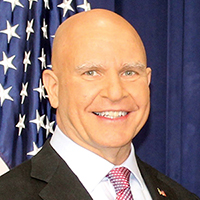
H.R. McMaster is the Fouad and Michelle Ajami Senior Fellow at the Hoover Institution, Stanford University. He is also the Bernard and Susan Liautaud Fellow at the Freeman Spogli Institute and lecturer at Stanford University’s Graduate School of Business. He was the 25th assistant to the president for National Security Affairs. Upon graduation from the United States Military Academy in 1984, McMaster served as a commissioned officer in the United States Army for thirty-four years before retiring as a Lieutenant General in June 2018.







